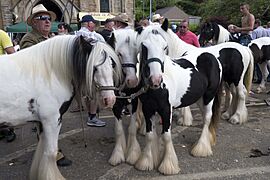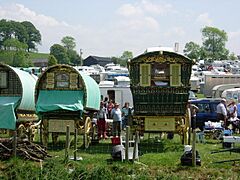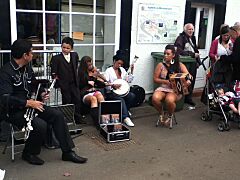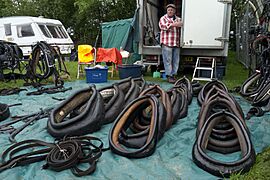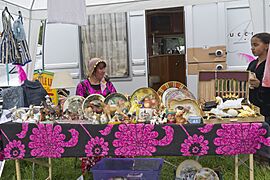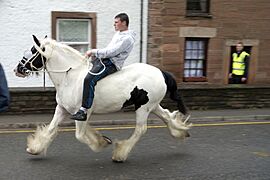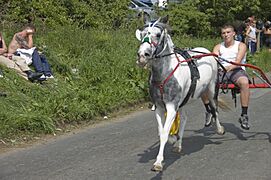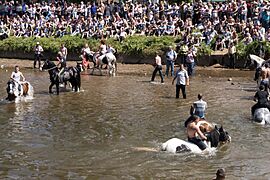Appleby Horse Fair facts for kids
Quick facts for kids Appleby Horse Fair |
|
|---|---|
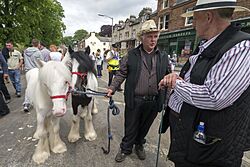 |
|
| Status | Active |
| Genre | Romani and Traveller horse fair |
| Date(s) | June |
| Frequency | Annually |
| Location(s) | Appleby-in-Westmorland |
| Country | England |
The Appleby Horse Fair is a huge yearly get-together for Romani (sometimes called Gypsies) and Travellers in the town of Appleby-in-Westmorland, England. This famous horse fair happens every year in early June. It's a massive event, bringing in around 10,000 Romani and Travellers, 1,000 caravans, and hundreds of horse-drawn wagons. About 30,000 visitors also come to see the spectacle.
Known as the biggest traditional Gypsy Fair in Europe, it's a place full of amazing sights. You can see horses being washed in the River Eden and then trotted quickly up and down a special road called the 'flashing lane' to show them off. There's also a large market where you can find traditional crafts, clothes, and food from the Romani and Traveller communities. The fair is a celebration of culture, with horse trading, storytelling, music, and dancing. You can also see beautiful, hand-painted traditional wagons called Vardos.
Contents
History of the Fair
The Appleby Horse Fair doesn't have an official starting paper, or "charter," like many old fairs. It actually began in 1775 as a "New Fair" to compete with an older, official fair in the town. At first, it was mainly for selling sheep and cattle. But when trains were built, livestock markets moved closer to the railway stations. Over time, the fair became a major gathering for Romani and Traveller communities who continued to trade horses there.
The original town fair closed down in 1885, but the "New Fair" kept going and became the event everyone knows today. A key principle of the fair has always been that it belongs to the people. No single group owns it, and nobody is charged an entry fee to attend. Its right to exist comes from a long history of being held every year, a legal idea known as 'custom'.
How the Fair is Organized
The fair is a spontaneous gathering, meaning it isn't run by one single company or group. However, the Romani and Traveller communities have a Shera Rom (which means Head Romani). He is the leader of his family and acts as a spokesperson for the wider community. He works with local authorities to make sure there are important services like toilets, water, and places for the horses to graze on Fair Hill.
The main events happen in a few key areas:
- Fair Hill: This is the main field for camping and has some food and market stalls.
- The Market Field: This area has become the main spot for stalls selling all kinds of goods and food.
- The 'Flashing Lane': This is a road where horses are trotted up and down at speed to show off their strength and beauty to potential buyers.
- The Sands: This is an area by the River Eden where people wash their horses. It's a famous sight, and you can often see many horses tied up near the river.
The fair usually starts on a Thursday in early June and ends on the second Wednesday of the month. While Tuesday used to be the main day for selling horses, Saturday is now the busiest day because of all the visitors.
Animal Welfare at the Fair
Groups like the RSPCA (Royal Society for the Prevention of Cruelty to Animals) watch the fair closely to make sure the animals are safe and healthy. The vast majority of horses at the fair are well-cared for and in great shape.
Sadly, there have been a few cases where animals were not treated well. In 2024, two horses died at the fair. This upset the community very much. The Shera Rom, Billy Welch, said it was a "stain on the reputation of the fair." Both he and the RSPCA said that most people at the fair love their animals and treat them with great care. When problems do happen, the people responsible can be prosecuted.
Past Fair Cancellations
The fair has been cancelled a few times in its long history.
- In 2001, it was cancelled because of an outbreak of foot-and-mouth disease, which can be very dangerous for farm animals.
- In 2020, the fair was cancelled because of the COVID-19 pandemic. However, a few people still came to keep the tradition alive, believing the fair would be lost forever if it didn't happen at all.
- In 2021, the fair was moved from its usual June dates to August because of COVID-19 rules.
- In 2022, the fair started a week later than usual so it wouldn't clash with the Queen's Platinum Jubilee celebrations.
Gallery
-
Washing horses in the River Eden
See also


